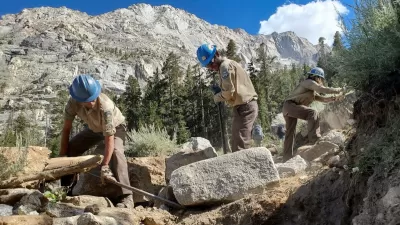The internet has great potential as a means of professional marketing for many soon-to-be and recent graduates. Not everyone in planning, however, uses it well. The following tips aim to help you realize its potential and avoid its pitfalls.
The internet has great potential as a means of professional marketing for many soon-to-be and recent graduates. Not everyone in planning, however, uses it well. The following tips aim to help you realize its potential and avoid its pitfalls.
Present yourself professionally: Creating a web site is simple these days using one of the professional services like LinkedIn or even Google Sites. Make an attractive, uncluttered, professional looking page with pertinent information. Post your resume, some work samples, and a general description of your interests. This can be a terrific marketing tool. As a reference writer, I have really appreciated it when students have sent me links to their (well-written and nicely illustrated) web sites. It can be a good place to present an online portfolio as well as to provide a bit more of a sense of the person. For example, one student turned out to be an activist dedicated to creating children's play spaces with a section of his web site devoted to this topic. It's a good idea to get a friend to look over before you go live, however.
If you have a blog, unless is it fully private, write like it is a magazine not an email to a buddy. I have employed someone because his travel blog was reflective with nicely composed images and thoughtful commentaries about the places he had visited. It clearly demonstrated that he was interested in the connections between people and places. A more free-form, stream-of-consciousness-style blog will at best leave potential employers wondering about your writing skills. One that divulges too much personal information-from romantic affairs to the gory details of your cat's health-will be hard to interpret at the very least. If you are critical of other people, even if because of their policy actions, be careful that the critiques don't seem unnecessary and unfair. Of course you can criticize poorly conceived policies or misplaced investments in wasteful infrastructure. Working against injustice and environmentally damaging actions is part of the ethic of planning. However, make very sure any criticisms are well reasoned and well written. Employers want to know that you will play well with others--in the office and outside it. And if you really do want to include more personal information try to first get feedback from several people who have been employers.
If you have a private site, like Facebook or a private blog, keep it private with a small number of highly trusted users. If it has a large number of members, or weaker passwords, remember that eventually someone else may see it and plan accordingly. On many sites it is also apparently easy enough for someone to link to a private page in a way that lets the public see them.
Reduce problems from other people's sites: You should not need to be told this, but Google yourself when you are looking for a job and no less than once every six months. If you, or close friends, are on Facebook then search it and any other relevant sites as well. Remember your friends may post public information about you even if you do not. Certainly employers were once in their 20s and understand youthful indiscretions. However, it really helps if you make this easy for them by reducing the amount they need to turn a blind eye to, particularly if it might cause any criticism from their bosses and the public. If you find problem materials, try to get them removed, particularly if they come up on the first one or two screens on Google. It isn't only social sites that can be problems. A colleague once discovered that the entire job applications for dozens of people had been placed on a public server, rather than the private one, by another university. The university was told quickly, but more minor versions of this happen all the time.
Lastly, and not quite on the same theme, don't expect faculty members, employers, or similar people to join your Facebook and similar pages: Many faculty members have a rule that they don't join such networks, rather than having to make a lot of decisions about who is a "friend" and who is not. Instead, a public Facebook page can reach such people-but remember it reaches the world!
My other blog is at http://healthymetropolis.blogspot.com/

Alabama: Trump Terminates Settlements for Black Communities Harmed By Raw Sewage
Trump deemed the landmark civil rights agreement “illegal DEI and environmental justice policy.”

Planetizen Federal Action Tracker
A weekly monitor of how Trump’s orders and actions are impacting planners and planning in America.

The 120 Year Old Tiny Home Villages That Sheltered San Francisco’s Earthquake Refugees
More than a century ago, San Francisco mobilized to house thousands of residents displaced by the 1906 earthquake. Could their strategy offer a model for the present?

In Both Crashes and Crime, Public Transportation is Far Safer than Driving
Contrary to popular assumptions, public transportation has far lower crash and crime rates than automobile travel. For safer communities, improve and encourage transit travel.

Report: Zoning Reforms Should Complement Nashville’s Ambitious Transit Plan
Without reform, restrictive zoning codes will limit the impact of the city’s planned transit expansion and could exclude some of the residents who depend on transit the most.

Judge Orders Release of Frozen IRA, IIJA Funding
The decision is a victory for environmental groups who charged that freezing funds for critical infrastructure and disaster response programs caused “real and irreparable harm” to communities.
Urban Design for Planners 1: Software Tools
This six-course series explores essential urban design concepts using open source software and equips planners with the tools they need to participate fully in the urban design process.
Planning for Universal Design
Learn the tools for implementing Universal Design in planning regulations.
Clanton & Associates, Inc.
Jessamine County Fiscal Court
Institute for Housing and Urban Development Studies (IHS)
City of Grandview
Harvard GSD Executive Education
Toledo-Lucas County Plan Commissions
Salt Lake City
NYU Wagner Graduate School of Public Service






























